

|
|
|

|
||

|
||

|
||

|
||

|
||

|
||

|
|
1. Is there a tie-breaker in Camelot Legends?
2. Are players permitted to spend a Card Action to move their opponents' Characters? No. Players may only move their own Characters from Location to Location, unless a card such as Dark Journey specifically allows them to do so. 3. Some Characters possess a bonus at the "same Location" as another particular Character. Do both of these Characters need to be in the same Company? No. A Character who receives a bonus at the "same Location" as another particular Character receives that bonus regardless of whether the particular Character is in his Company or another player's Company at the same Location. However, many Characters do specify that they receive a bonus if they are in the "same Company" as another Character, so be aware of this distinction. 4. The six Kings in Camelot Legends each possess special text that adds +1 in a particular Ability to "all other Characters" in their Company. Does this bonus apply to each Character, or just to the Company's combined total in that Ability?
5. Two Event Cards (The Green Knight and Mystic Temptation) apply a bonus to the "total combined" Adventure or Psyche Score of "each of your Companies." How does that work? This bonus applies to the Company's total score and does not enhance the individual Ability Scores of the Characters in that Company. For example, if a player with the Green Knight Event in her Victory Display has a combined total of 16 Adventure in one of her Companies, the Green Knight would boost that Company's total up to 18 Adventure. 6. If a Character "cannot be targeted by opponents' Characters", can that Character be affected by an Event Card? Yes. Cards like Excalibur and Lady Lyonesse specifically protect Characters from the text of another Character that uses the term "target". These protected Characters are not immune to Events like Assassination or Trial By Combat. 7. Are there any cards that can protect Characters from the effects of an Event Card? Yes. The Siege Perilous protects the Character it targets from being discarded under any circumstances, whether due to Character or Event text (unless the protected Character is bid to a Bidding Event, as specified on the Siege Perilous card). Similarly, Sir Dinadan and all Knights in his Company can ignore the effects of Event Cards during an opponent's turn. 8. If an Event can potentially affect more than one Character, who chooses which Character is affected? Is it the player who completes the Event? Not necessarily. The player who is directed by the Event Card to perform the effect will choose the Character if more than one candidate is viable. For example, Trial by Combat reads: "The Player who completes this Event can immediately discard any one Character in Cornwall." In this case, the player completing the Event is the one who chooses which Character is discarded. However, Grand Tournament reads: "When a Company completes this Event, every other Company at Camelot must discard its lowest Combat Knight." Since the Grand Tournament directs the other Companies themselves to discard their lowest Combat Knight, if a Company includes two or more Knights who share the lowest Combat score, the player owning those Knights chooses the victim. Similarly, both the Siege Perilous and the Tournament of Logres direct players to affect one of their Characters with the highest score in a particular Ability. If more than one Character qualifies, then the player owning those Characters chooses which one will be affected. 9. If a player is determining which Characters will be affected by an Event, do they use the Character's base Ability Scores, or their modified Ability Scores? Always use the Characters' current, modified Ability Scores. In the case of Tournament of Logres, a Character in the same Company as King Ban or King Lot might be chosen to participate due to his current, modified Ability Scores even though those scores will change after he is moved to the Tournament of Logres Event. 10. What happens to a Character's Special Card if that Character leaves play? As mentioned on page 9 of the Rulebook, if a Character is discarded or returned to your hand, return his Special Cards face up to their place beside the main playing area. Individual Cards Important clarifications regarding many of the game's Character Cards are included in the back of the Rulebook of Camelot Legends. What follows are additional clarifications for a few of the Characters, as well as for key Event Cards and Special Cards. The Black Knight While the Black Knight Event covers another Forest Event Card, the covered card is not considered in play for any purpose. Therefore, if there are already two Events at the Forest when the Black Knight is drawn, and if the player chooses to cover one of those Events, then there are still considered to be only two Events at the Forest. Therefore, the Questing Beast could be moved back to the Forest under these circumstances because there is an open slot in the Forest, even though there are actually three Event Cards there (one being covered by the Black Knight). As mentioned in the Rulebook, if there are already three Events at the Forest when the Black Knight is drawn, the player drawing the Black Knight can choose to discard it or place it on top of another Forest Event Card. Castle of Maidens
If the player has the capability to complete another Event with different Characters at a Main Location during the same turn, he is permitted to complete it before completing the Castle of Maidens. However, he cannot complete the Castle of Maidens and then use any of the Characters located there to complete another Event that turn. Note that when moving Characters away from the Castle of Maidens, the Company Limit of 6 still applies at their new Location, even for the player who completed the Castle of Maidens. If a player now possesses more Characters than will fit at all three Main Locations, he must choose to discard the excess Characters from those located at the Castle of Maidens. Sir Dagonet
Even if the Character replaced by Dagonet is preserved by Sir Lambegus, the Character is still "replaced" (that is, any Special Cards placed on him are now placed on Dagonet). However, the replaced Character remains a part of his original Company and Lambegus is discarded in his stead. It is important to note that the Knight protected by the Siege Perilous cannot be discarded under any circumstances and is therefore immune to Sir Dagonet. Finally, although Sir Dagonet can be played during a Bidding Event, he must replace a Character previoulsy bid during that Event. Bidding Dagonet in this manner does not add to the total number of Characters bid by the players during the Bidding Event (although Dagonet continues to take up the slot held by the Character he replaced). Isle of Avalon Like all Locations, Character Card Text at the Isle of Avalon continues to function normally. Therefore, if Princess Guinevere is at Avalon while Sir Lancelot is there, Lancelot receives his normal bonus to all of his Ability Scores (including his Adventure Score, which will earn him an extra Victory Point for the Isle of Avalon at the end of the game). Similarly, Characters such as Sir Mordred can target other Characters normally at Avalon. Keep in mind that since each player is limited to moving only one Knight and one Lady to Avalon each game, if a player loses his Knight at Avalon, he may not move another Knight there again. Love Potion
Note that other effects used against the Bearer or his Companion which do not actually discard a Character have no additional side effects. For example, if one player steals the Bearer's female Companion after completing the Villainous Request, the Bearer is not discarded, but is still linked to the stolen Companion for discarding purposes. Also, if the Bearer is sent back to his owner's hand (for example, through the Tournament of Logres), then the female Companion is not discarded, although the Love Potion returns to its place face up beside the main playing area. Should the Love Potion be taken away in this manner (or if, for example, another player seizes the Love Potion by completing another Event), then the original Bearer and Companion are no longer affected by the Love Potion and are no longer linked for either movement or discarding purposes. Nimue Nimue's ability continues to negate the target's Card Text until the beginning of her controlling player's next turn, even if Nimue has been removed from play before that time. The Questing Beast
Once the Round Table is completed by any player, it benefits all players for the remainder of the game (unless the Event is later discarded by the Archbishop of Canterbury). Although Knights with No Allegiance do not help a Company receive the benefits of the Round Table, a Knight with two different Allegiances (such as Percival, Bors, or Gareth) uses both of them when determining if his Company includes Knights from three different Allegiances. For example, if King Arthur (Pendragon Allegiance) and Sir Percival (De Gales Allegiance and Holy Knight Allegiances) are in the same Company, that Company benefits from the effects of the Round Table. Sir Sagramore Add all relevant modifiers to Sagramore's Combat Score before doubling it with this ability. This ability may be used in conjunction with Princess Isolde's ability (thereby quadrupling Sagramore's Combat Score). Siege Perilous If the highest Psyche Knight is set to be discarded at the end of the turn for any reason, including using his own Card Text (for example, if Sir Bors uses his ability to boost his Psyche in order to help complete the Siege Perilous), then that Character still remains in play. Thus, the Knight of the Siege Perilous can use such a special ability every turn of the game. Theft of Excalibur The Company completing this Event gains Excalibur even if Excalibur is not owned by another Character. In other words, the Company does not have to "steal" Excalibur from another Character even though the title of the Event includes the word "Theft". Sir Tristan As long as Princess Isolde is in play in a Company other than Sir Tristan's (even if she is in another Company belonging to the same player at a different Location), Tristan receives a -4 penalty to his Psyche, reducing him to a Psyche of -1. This also applies if Isolde is at the same Location as Tristan in another player's Company (although Tristan still receives the bonus to his Combat for being at her Location). Tristan does not receive the -4 penalty if Isolde is in someone's hand or in the discard pile, or if she is placed beneath the Castle of Maidens (since she is not in another Company when placed beneath the Castle of Maidens). Sir Turquin Knights placed beneath Turquin are considered out of play for purposes of normal gameplay. Turquin is still considered a single Character for purposes of movement, and can still move together with another Character for a single Action. If Turquin is discarded or returned to his controlling player's hand, then all Knights placed beneath him are discarded and his controlling player gains no Victory Points from his prior conquests, even if Turquin is later returned to play. If Turquin is stolen by another player (for example, through the use of Morgan le Fay), then any existing Knights placed beneath him will benefit the new player at the end of the game. When using Turquin's ability, the controlling player may only take 1 Card Action that turn, even if he controls the High King or completes the Feast of Pentecost that turn. |
Questions about the Camelot Legends game rules?
Please email the designer at webmaster@njkingdom.com.
© 2004 Z-Man Games, Inc. All rights reserved.
Venture Game Mechanics ™ & © 2003 Andrew Parks.
All images © 2004 to their respective artists.
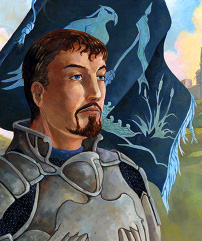 Although the official rule is that "a tie is a tie," many players have requested that we come up with a tie-breaker system. Therefore, as an optional rule, among the players who are tied for first place, the player who has completed the most individual Event Cards wins the game. Therefore, a player who has achieved a high Victory Point total by completing many different Events will defeat a player who has achieved the same total by obtaining the Special Cards and/or a few high scoring Events.
Although the official rule is that "a tie is a tie," many players have requested that we come up with a tie-breaker system. Therefore, as an optional rule, among the players who are tied for first place, the player who has completed the most individual Event Cards wins the game. Therefore, a player who has achieved a high Victory Point total by completing many different Events will defeat a player who has achieved the same total by obtaining the Special Cards and/or a few high scoring Events.
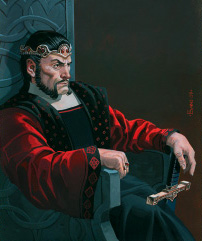 This bonus applies to each and every Character except for the King himself. Therefore, the larger the Company, the stronger the bonus.
This bonus applies to each and every Character except for the King himself. Therefore, the larger the Company, the stronger the bonus.
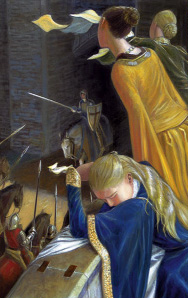 The Castle of Maidens is a Special Location where Characters can be played and moved, just like other Locations. If a player does not have any female Characters on the table when this Event is drawn, he does not need to place a female Character under the Castle of Maidens, even if he possesses such a Character in his hand. The Castle of Maidens can be completed during the Complete Location Events phase of a player's turn as long as he has a Company at the Event with a combined total of 18 in any one Ability. When this happens, he immediately gains possession of the captured female Characters (his Company there is permitted to exceed the Company Limit of 6 temporarily while the player decides where to move his Characters, which must be done immediately). After the Event is completed, all Characters owned by all players at the Castle of Maidens must immediately be moved to the Main Location(s) of their players' choices, after which the Castle of Maidens Event goes into the Victory Display of the player who completed it. The turn then ends immediately, which means the player who completed the Event cannot complete any other Events for the remainder of that phase or take any Card Actions that turn.
The Castle of Maidens is a Special Location where Characters can be played and moved, just like other Locations. If a player does not have any female Characters on the table when this Event is drawn, he does not need to place a female Character under the Castle of Maidens, even if he possesses such a Character in his hand. The Castle of Maidens can be completed during the Complete Location Events phase of a player's turn as long as he has a Company at the Event with a combined total of 18 in any one Ability. When this happens, he immediately gains possession of the captured female Characters (his Company there is permitted to exceed the Company Limit of 6 temporarily while the player decides where to move his Characters, which must be done immediately). After the Event is completed, all Characters owned by all players at the Castle of Maidens must immediately be moved to the Main Location(s) of their players' choices, after which the Castle of Maidens Event goes into the Victory Display of the player who completed it. The turn then ends immediately, which means the player who completed the Event cannot complete any other Events for the remainder of that phase or take any Card Actions that turn.
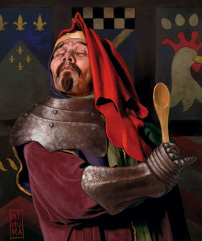 King Arthur's fool, Sir Dagonet, furthered the humor of the Court by brazenly impersonating great heroes such as Sir Lancelot and then chasing down cowardly knights such as King Mark. Sir Dagonet's Card Text simulates his love for mischief. When he replaces an existing Character on the table (male or female), it signifies that the replaced Character was actually the cunning jester in disguise. Because Dagonet's Card Text does not include the word "target," he can replace almost any Character in the game, including those who "cannot be targeted by opponents' Characters." Also, because Dagonet "replaces" an existing Character, he retains that Character's Special Cards.
King Arthur's fool, Sir Dagonet, furthered the humor of the Court by brazenly impersonating great heroes such as Sir Lancelot and then chasing down cowardly knights such as King Mark. Sir Dagonet's Card Text simulates his love for mischief. When he replaces an existing Character on the table (male or female), it signifies that the replaced Character was actually the cunning jester in disguise. Because Dagonet's Card Text does not include the word "target," he can replace almost any Character in the game, including those who "cannot be targeted by opponents' Characters." Also, because Dagonet "replaces" an existing Character, he retains that Character's Special Cards.
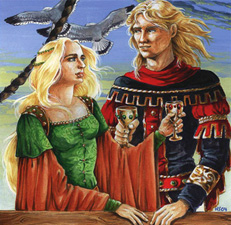 The Bearer of the Love Potion and his chosen Companion can move together "for free," which means they don't use up a Card Action. The player owning these Characters is not required to use this movement ability, and can choose to move either Character separately or with another Character (but without the free movement). If either the Bearer or the Companion is discarded for any reason, even for using his or her own Card Text or for being discarded at the end of a Bidding Event, then the other Character must also be discarded. The death bond between the Characters continues even if they are not at the same Location or even if they are no longer owned by the same player. For example, if Morgan le Fay steals the Bearer of the Love Potion, and later the Bearer or the Companion is discarded for any reason, their counterpart will also be discarded. If the two Characters are owned by separate players in this way, they lose their ability to move together for free, since players are only permitted to move their own Characters.
The Bearer of the Love Potion and his chosen Companion can move together "for free," which means they don't use up a Card Action. The player owning these Characters is not required to use this movement ability, and can choose to move either Character separately or with another Character (but without the free movement). If either the Bearer or the Companion is discarded for any reason, even for using his or her own Card Text or for being discarded at the end of a Bidding Event, then the other Character must also be discarded. The death bond between the Characters continues even if they are not at the same Location or even if they are no longer owned by the same player. For example, if Morgan le Fay steals the Bearer of the Love Potion, and later the Bearer or the Companion is discarded for any reason, their counterpart will also be discarded. If the two Characters are owned by separate players in this way, they lose their ability to move together for free, since players are only permitted to move their own Characters.
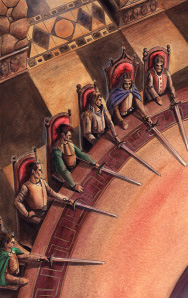 The Round Table
The Round Table